Are you a traveling RVer looking to settle down for a month or a season? Or are you a more stationary camper looking for a permanent place to park your RV or trailer?
No matter how you live with your home on wheels, long-term RV parks offer a great option for those looking to stay in one location or move seasonally.
When making reservations for long-term (a month or longer) stays in RV parks and campgrounds, there are many things to consider, and I’m sure that you have a thousand questions. After all, finding a campground with long-term availability that meets all your needs can be a quite difficult task.
But fear not! This guide will help you find the best long-term RV park for your lifestyle.
What is a Long-Term RV Park?
A long-term RV park is like any other RV park or campground, except that it is intended for RVers that plan to stay a month or more. While most RV parks function off RVers who book a night or two, long-term parks seek more permanent tenants.
Many RV parks serve both types of RVers, and the park will be filled with transient guests and full-timers. Instead of paying a daily site fee, tenants of a long-term RV park pay dues either at the start of the month or the start of the season.
Can You Live in an RV Park Year-Round?
Absolutely! Across the United States, you can find RV parks that cater to long-term residents.
While many RV parks are seasonal, many are also open 365 days a year.
Often, these RV parks are in warmer climates, but year-round RV parks can be found in colder climates as well.
Winter RV Living
RVing year-round in a cold climate is not as cold as it initially sounds either! I’ve personally camped in sub-zero temperatures in a pop-up A-frame camper, and it was still quite comfortable.
If you have an adequate heat source and proper insulation, staying warm during the winter months is no problem.
Many full-timers that reside in RV parks during winter months will insulate their RV with skirting.
Skirting is essentially a “skirt” that goes from the bottom edges of your RV down to the ground, all the way around.
This is extremely helpful for keeping warm in the winter months, as it blocks the cold air from getting trapped underneath your RV.
It keeps the rig’s pipes from freezing and your feet warm as well! If you’re choosing to live long-term in an RV park during the winter, this is highly recommended and there are many guides out there such as this one.
The Benefits Of Living In An RV Full Time In A Park
Living in an RV park long-term can be great decision for any RVer looking to settle down for a bit.
Choosing to become stationary comes with a long list of benefits that you just simply can’t get while living out on the open road.
1. A Long Term RV Park Could Be Cheaper
As the cost of housing has drastically risen across the United States, many people have chosen to reside full-time in RV parks as a cheaper alternative.
In most cases, the rent at an RV park is hundreds of dollars less than an apartment. This is especially the case in tourist-heavy areas.
The great part about this though, is that it allows you to live in a beautiful, sought-after location that you otherwise wouldn’t be able to afford!
For example: For two years now, I have spent the winter ski season RVing in Lake Tahoe, CA. Ski towns are always ridiculously expensive, and Tahoe is no exception.
While most 1-bedroom apartments go for $2000/month in the area, I can enjoy this beautiful mountain landscape and snowboard whenever I want for only $875/month!
2. Stability
Another plus of living long-term in an RV park is that it gives you a sense of stability.
Oftentimes, travelers can feel like they don’t have a place to call home when living on the road.
Parking the RV and being stationary for an amount of time can serve as a great break from constant traveling.
It’s also a great opportunity to stay put and make money if you rely on seasonal work as your source of income.
3. Freedom
While a wanderlust RVer may see staying at a long-term RV park as the opposite of freedom, compared to renting an apartment or owning a home, it really is that much more liberating.
At most long-term RV parks, you are free to leave whenever you’d like and are only obligated to the month that you paid for. This is perfect for people that get restless quickly.
4. Community
Finally, the sense of community at RV parks is hard to find anywhere else.
There is something about the commonality of everyone living in an RV that brings neighbors together.
People love to socialize and meet their neighbors at RV parks, so it’s a great opportunity to make friends and other travelers.
As most know, this can be pretty hard to do out on the road and it does get lonely at times.
Types of Long-Term RV Parks
Long-term RV parks come in different varieties. It’s important to choose a park that best accommodates the lifestyle you’re trying to live. The different types of long-term parks include:
Monthly RV Parking
Monthly RV parks offer sites that you rent one month at a time. This is a great option for RVers that want to experience a location for a shorter period while remaining mobile.
Site dues are collected upon arrival, and if you want to extend your stay, you simply pay again the next month.
Depending on the park, sometimes a security deposit is required. This ensures that any unpaid utility bills or site damage will be covered.
Some parks have all utilities included, while some require the tenants to pay the bill.
Seasonal RV Parking
Seasonal RV parks are often found in locations that are weather dependent. They are usually only open from May-October and close during the winter months.
However, you can find RV parks that offer winter seasonal rates (often at a huge discount!).
At a seasonal RV park, RVers generally pay for the entire season up-front.
While this is a larger amount of money, it comes at an enormous discount. Utilities are normally included in the seasonal price.
A seasonal RV spot is a great way to spend an entire season in a desirable location. It can also be the perfect place to establish a “vacation home.”
Many RVers park their rig at their seasonal RV park and just visit it when they want a getaway.
Annual
Annual RV parks operate much like monthly parks, in the sense that site dues are collected at the beginning of every month.
However, these parks usually require a longer-term commitment in the form of a lease.
Leases range from six months to an entire year. These RV parks are normally restricted to RVers that intend to stay for that amount of time.
How Much do Long-Term RV Parks cost?
There is no one size fits all pricing for long-term RV parks. Price is completely dependent on the park’s location, proximity to points of interest, and amenities.
In remote parts of the country, monthly RV sites can be as cheap as $300/month.
In highly visited and desirable locations, luxury RV parks can be thousands of dollars per month! In general, most long-term RV parks fall somewhere in the middle and are priced anywhere from $600 to $900 a month.
This may or may not include utilities, so always be sure to factor that into your budget.
Long-Term Price Advantages
The longer you stay at an RV park, the more affordable it becomes. Most RV parks offer nightly, weekly, and monthly rates, with some even offering seasonal as well.
Take for example the rates at Rancho Sedona RV Park in Sedona, Arizona for a standard site.
You can see that it becomes exponentially more affordable to stay at the weekly rate compared to the nightly, and even more so at the monthly rate compared to that!
Rancho Sedona RV Park (as of April 2022) | |
Nightly | $83.00 + tax |
Weekly | $513.00 + tax |
Monthly | $850.00 + electricity |
6 Steps to Finding the Best Long-Term RV Parks Near You
Finding the best long-term RV park that fits your needs can be exhausting! It requires a lot of personal research and phone calls with the parks you are interested in.
So how do you go about this arduous process?
The best way to find the long-term RV park for you is to break it down into six simple steps. This will simplify and organize the process.
1. Decide on a Location
This is the very first step in your search for the perfect long-term RV park. You need to figure out where you want to go!
Perhaps you’re looking for a new part of the country to enjoy an extended vacation. Or maybe you’re looking for an RV park that’s close to your work.
No matter what your intention is, this part is crucial as it will narrow down which long-term RV parks are available to you.
2. Find and Create a List of all RV Parks in This Area
Now that you know where you want to go, you must find all the possibilities in this area. There are a variety of ways to do this.
How to Find the Best Long-Term RV Parks Near You
The easiest way to find what RV parks are in your desired location is to do a simple search on Google Maps. Searching “RV parks near me” will pull up all parks in the area.
It may be worthwhile to also search “Campgrounds near me,” as these could be an option as well and won’t show up on an RV park search.
Finding RV parks this way will provide you with the websites and contact information of all the RV parks in the area, making your research that much easier.
Another way to find long-term RV parks is to browse classified ads and/or talk to local people.
Sometimes long-term RV parks lack a website or don’t show up on a Google map search. Browsing Craigslist and Facebook marketplace housing could turn up additional results.
3. Determine Your Needs in an RV Park
Once you have a complete list of all the RV parks in your desired area, it’s important to figure out what you’re looking for in a long-term RV park.
Everyone has different needs, so by identifying these you can narrow down prospective parks even further.
Some questions to ask yourself include:
4. Do online research
Once you have your needs narrowed down, begin by doing preliminary research. Visit the websites of each RV park and see what they have to offer.
Most parks with a decent website will post their rates and amenities. Identify any parks that don’t have what you’re looking for and cross them out from your list.
5. Contact RV Parks
Not all RV parks have a stellar website, making it hard to do your own research.
In these instances, calling the RV park will determine if it’s the right fit for you. Be sure to ask all questions relating to your needs.
Once you have a shortened list of all RV parks that meet your requirements, you need to call them to check availability.
Long-term RV parks often fill up quickly in popular areas of the country. Occasionally, there is even a waiting list. Take this into consideration when planning your move-in date.
6. Choose Your Long-Term RV Park!
Finally, once you have a couple of RV parks that meet all your needs and are also available, decide on your park!
Make your reservation with the RV park over the phone, schedule your move-in day, and have any required payment ready once you arrive.
What are the Best States for Full-Time RV Living?
While there is no single state that is the best for full-time RV living, certain states are more popular than others.
These states are marked by their consistently warm weather, low cost of living, and tendency to be RV friendly.
Here are a few states and some RV-related stats to inspire your next move!
Florida
No state is more synonymous with RVers than Florida. Every winter, thousands of snowbirds flock to this southern state to escape the harshness of the cold winter months.
With literally hundreds of RV parks and campgrounds, RVers have plenty of choices when it comes to finding a home.
The average annual temperature in Florida is 70.7 degrees, making it one of the most comfortable climates for RVing in the country.
Additionally, Florida has no income tax and allows mail-forwarding services should you want to take your RV life on the road permanently.
Texas
The Lonestar star is the largest state in the lower 48 and with over 260,000 square miles an RVer could roam for months and never get bored.
The state is home to Big Bend, an extremely popular RV destination.
Texas is also home to plenty of RV parks for long-term living and has good weather most of the year, with an average temperature of 65 degrees annually.
Like Florida, Texas has no income tax and access to mail-forwarding services, but it is also incredibly easy to register vehicles and RVs here (by mail), making it an ideal state to call home base as an RVer.
South Dakota
South Dakota may not be the best state to live stationary full-time in your RV, but it is no doubt one of the most beneficial states when it comes to establishing a domicile.
South Dakota has some of the lowest vehicle registration fees and taxes in the country, and like Florida and Texas, it has no income tax, as well as mail-forwarding services.
A huge benefit of making South Dakota your home state is that it requires no vehicle inspection.
You’ll no longer have to deal with visiting your home state at least once a year to renew your inspection. As small of a detail as this may seem, it’s incredibly convenient.
Additional Considerations When Choosing a Long-Term RV Park
When choosing an RV park to stay at long-term, there are many small details to take into consideration.
Not all RV parks are created equal, so when deciding on a park it’s always important to check on factors such as:
Year Restrictions
Many long-term RV parks have restrictions on older RVs (10 years old or newer is common), mainly to keep up appearances and to avoid tenant RVs that have severe cosmetic or mechanical damage.
Oftentimes, however, they do allow older RVs on a case-by-case basis. They will ask for pictures of your rig, and the manager will make the final decision.
So, if you have an older RV that is in good shape it never hurts to ask if they will make an exception.
Length Requirements
In addition to year requirements, some RV parks have minimum length requirements for long-term tenants.
These parks are generally looking for RVs that are 24-26ft or longer. If you have an RV that is on the smaller side (such as a pop-up or truck camper), you may have to look at other parks that do not have these restrictions.
Pet Policy
If you have any pets, it’s imperative that you double-check the RV park’s pet policy.
Not all RV parks allow pets, some only allow a certain amount, and some have restrictions on breeds.
Checking this beforehand will ensure that you will have no problem when you arrive at your park.
Conclusion
I hope this guide has helped you in your search for you next place to call home!
Finding and deciding on a long-term RV park can be a daunting task, but with this information you can now navigate the process smoothly.
Living in a long-term RV park is an affordable way to experience beautiful parts of the country more thoroughly, and it also serves as a great sense of community that is hard to find elsewhere.
So, if you were considering moving into an RV park full-time, you now know that it is completely possible!
Happy RVing.

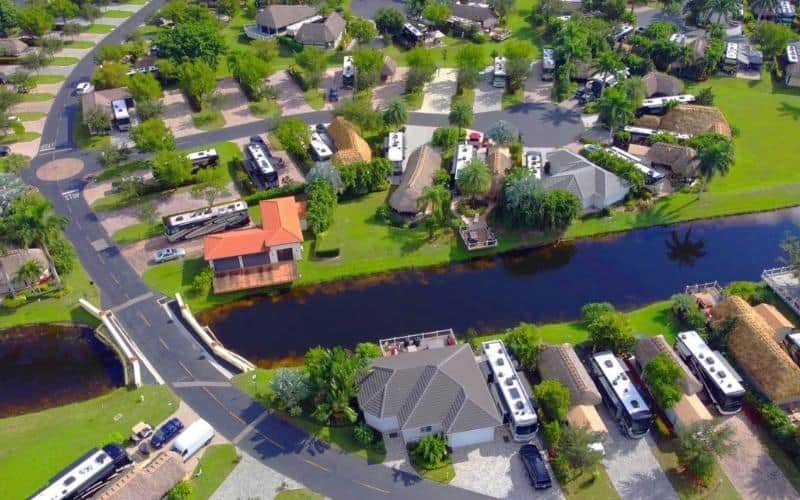
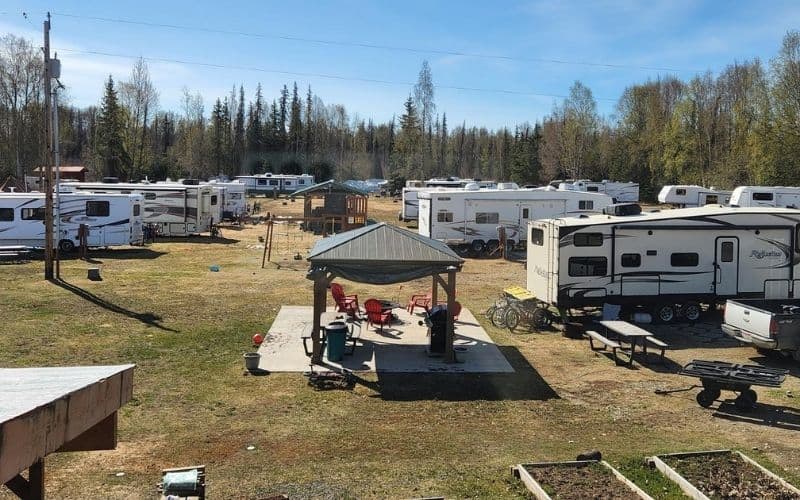
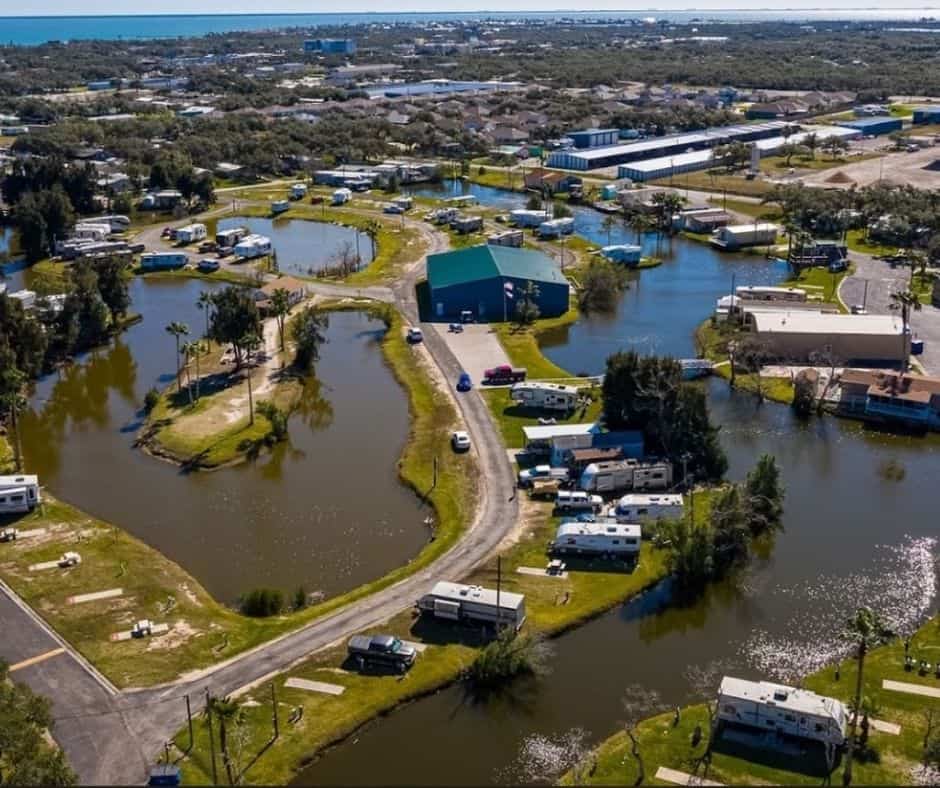
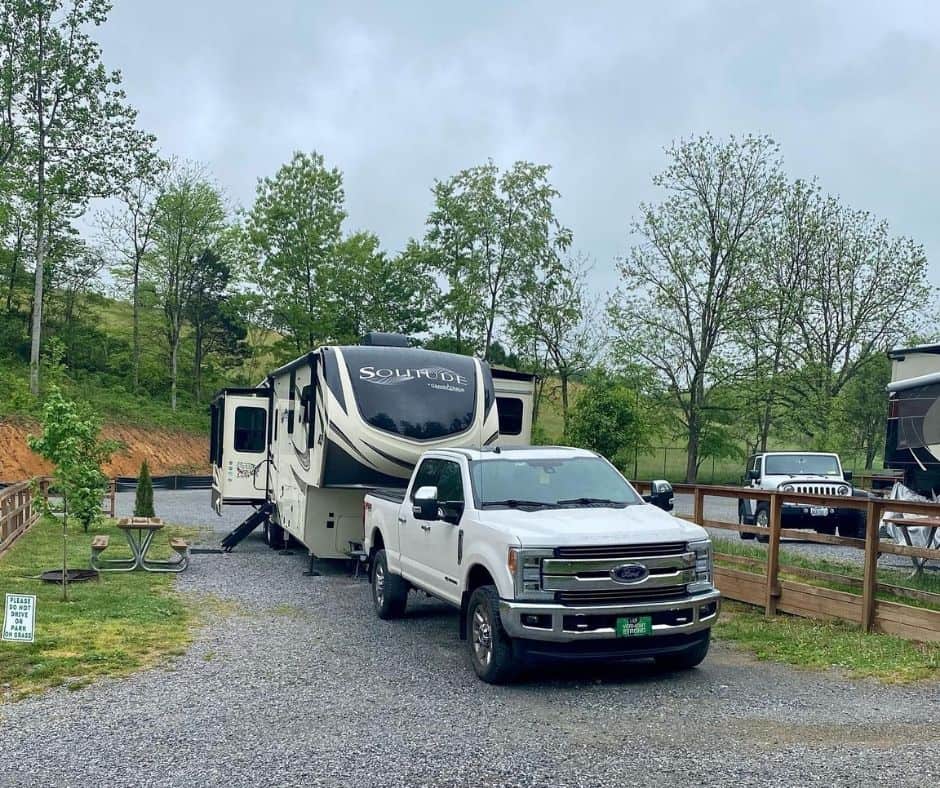

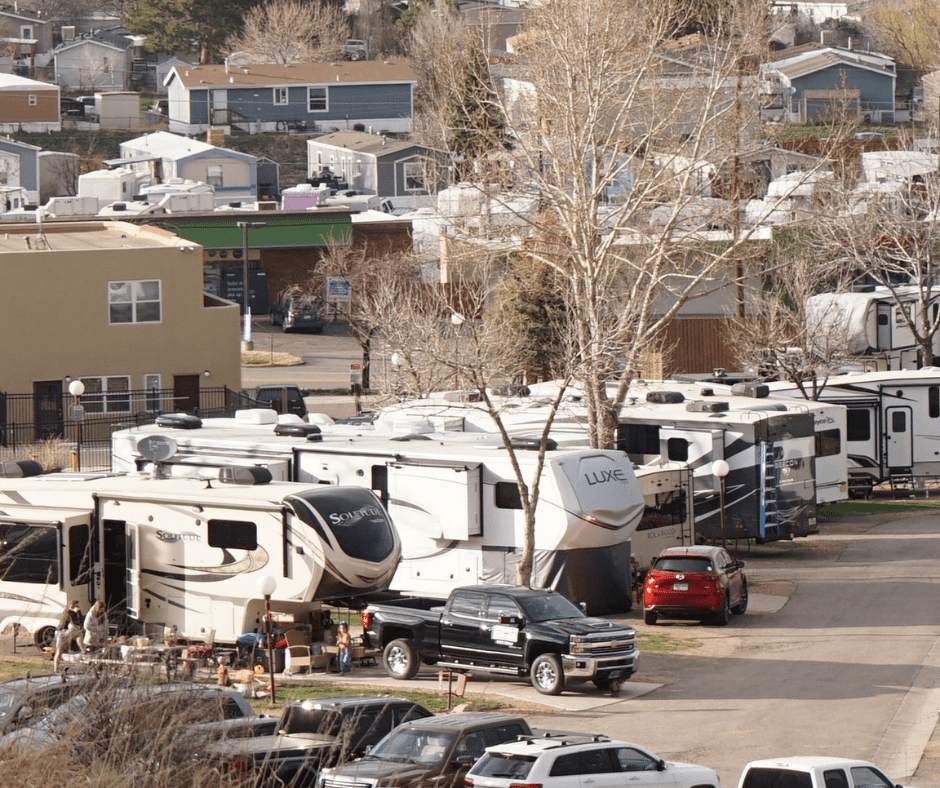
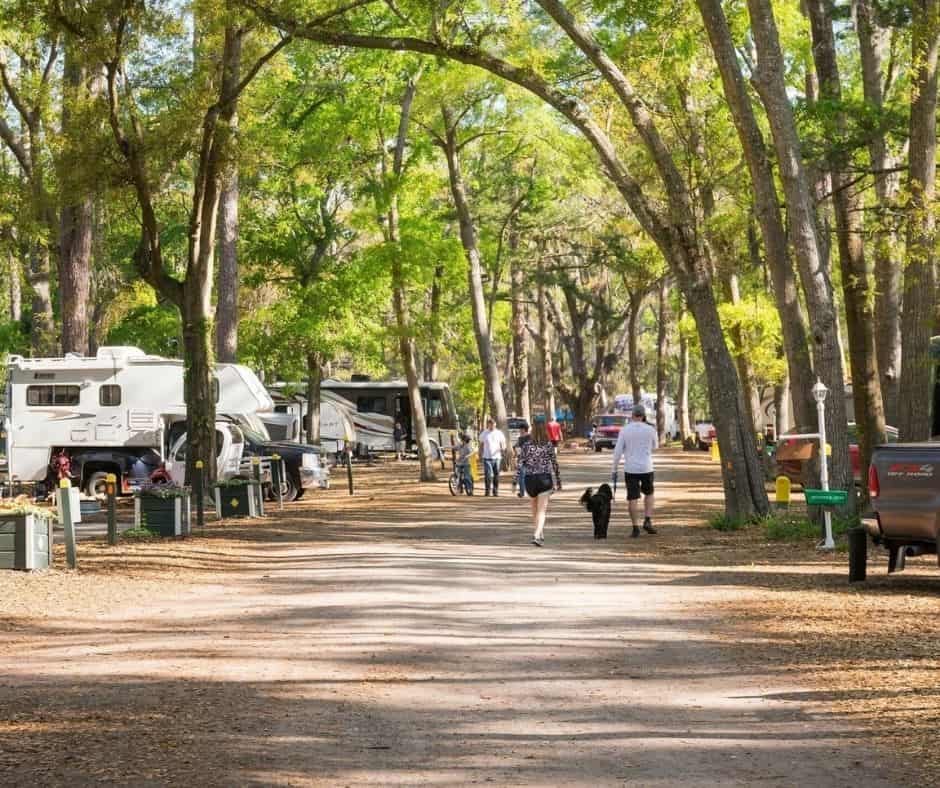

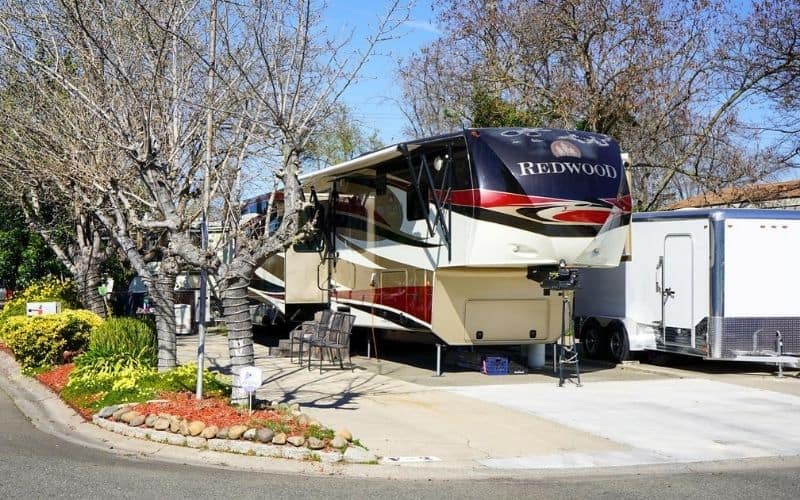


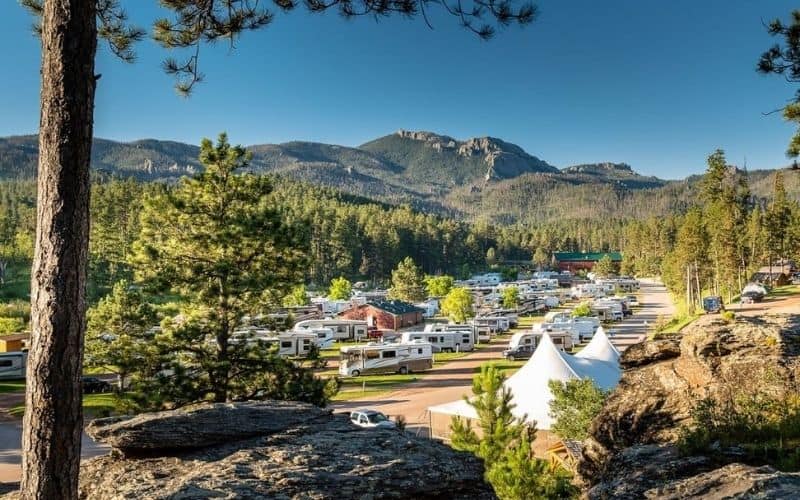
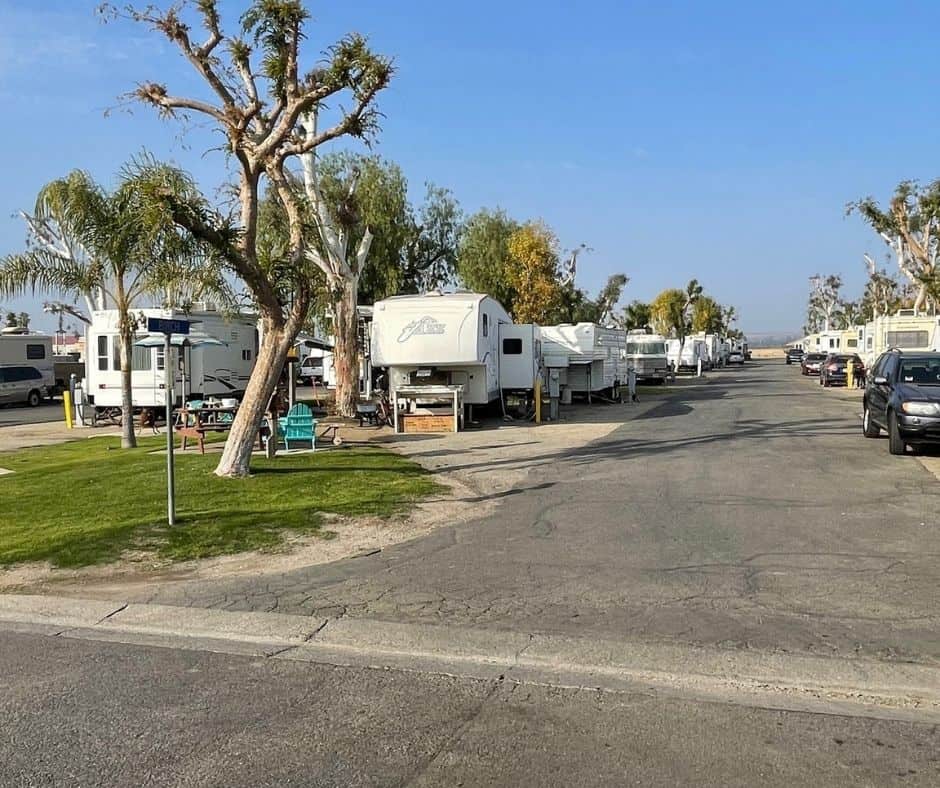

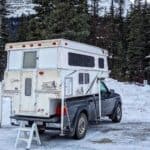
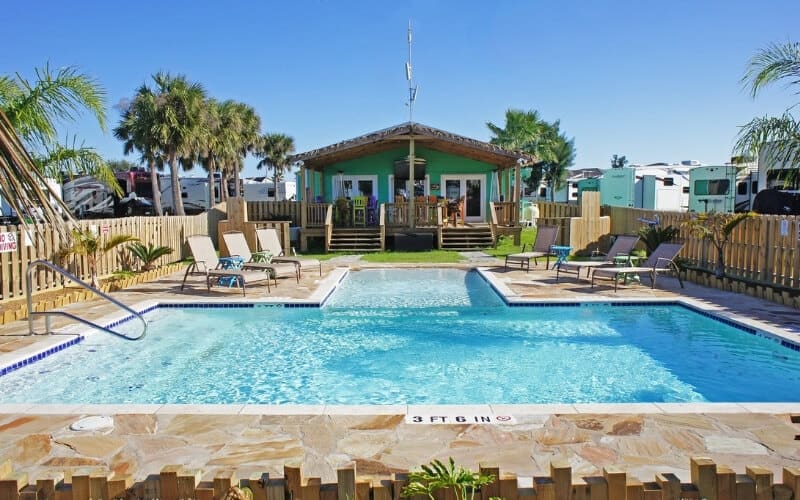
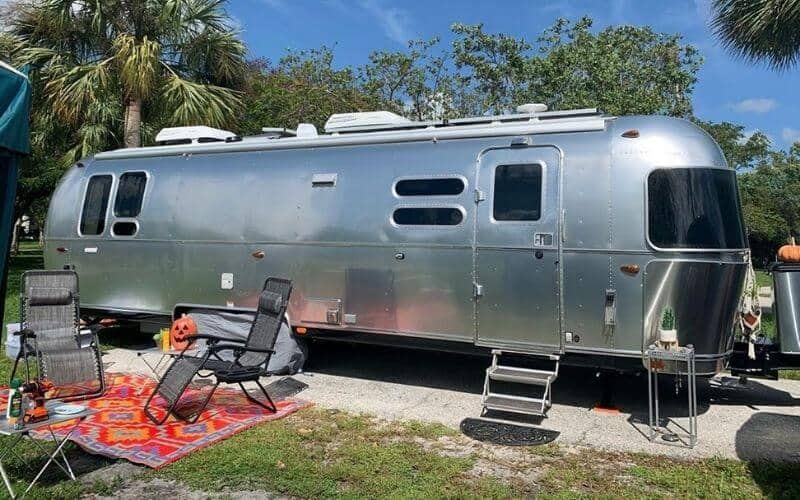
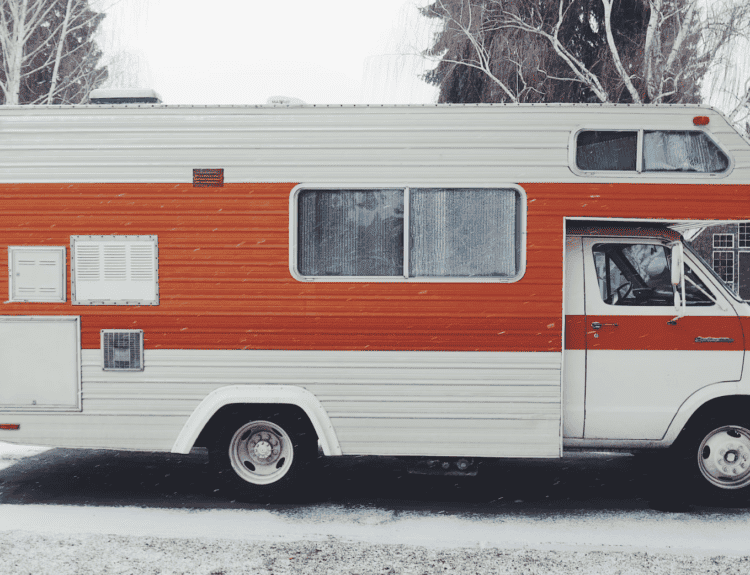
1 Comment
Cheryl
2 years agoDo you have a full list of Long term and Annual stay campgrounds in Alabama, like Water front or lake view lots with 50 amp, water, electric garbage and sewer service included or available?